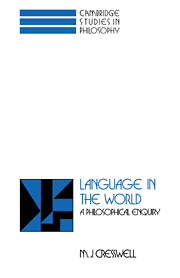Book contents
- Frontmatter
- Contents
- Preface
- Introduction
- 1 A simple formal language
- 2 Predicates and functors
- 3 The isomorphism problem
- 4 Quantification
- 5 Transmundism
- 6 Putnam's ‘Meaning of “meaning”’
- 7 Lewis on languages and language
- 8 Causation and semantics
- 9 Belief–desire psychology
- 10 Direct knowledge
- References
- Index
7 - Lewis on languages and language
Published online by Cambridge University Press: 01 October 2009
- Frontmatter
- Contents
- Preface
- Introduction
- 1 A simple formal language
- 2 Predicates and functors
- 3 The isomorphism problem
- 4 Quantification
- 5 Transmundism
- 6 Putnam's ‘Meaning of “meaning”’
- 7 Lewis on languages and language
- 8 Causation and semantics
- 9 Belief–desire psychology
- 10 Direct knowledge
- References
- Index
Summary
One of the few authors who has attempted to address the question of what it is about the linguistic behaviour of a population which justifies our saying that some particular model-theoretic interpretation is the right one for the language they speak is David Lewis (1975). Since I have already used ℒ for a syntactically specified language I will use ℒ+ for a language together with its interpretation rather than Lewis's ℒ. Lewis's proposal is (Lewis 1975, p. 7)
the convention whereby a population P uses a language ℒ+ is a convention of truthfulness and trust in ℒ+. To be truthful in if is to act in a certain way: to try never to utter any sentences of ℒ+ that are not true in ℒ+. Thus it is to avoid uttering any sentence of ℒ+ unless one believes it to be true in ℒ+. To be trusting in ℒ+ is to form beliefs in a certain way: to impute truthfulness in ℒ+ to others, and thus to tend to respond to another's utterance of any sentence of ℒ+ by coming to believe that the uttered sentence is true in ℒ+.
Where Lewis speaks of an interpreted language, which I have represented by ℒ+ in quoting him, I prefer to speak of a language if, together with an interpretation (W,D,V). I shall assume that speakers of ℒ+ are members of D and that their properties and the relations among themselves and to other things are all appropriate set-theoretical entities constructed out of W and D. In particular, their beliefs may be construed as relations to propositions.
- Type
- Chapter
- Information
- Language in the WorldA Philosophical Enquiry, pp. 94 - 114Publisher: Cambridge University PressPrint publication year: 1994

